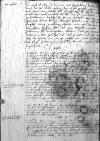Uns sein gestrigs tags von(n) ko(nigliche)m hove brive geword(en), in welchen hidden by binding⌈[chen]chen hidden by binding⌉ der hochwirdig h(er) ⌊bischoff zu Ploczko⌋ uns schreibt, / das im superinscribed⌈imim superinscribed⌉ den XV dits ⌊ko(niglich)e m(aieste)t⌋, u(nser) a(llergnedigster) h(e)r, im das bischtumb zu ⌊Krako⌋ / ( wider iren willen(n) ) gnediglich hidden by binding⌈[h]h hidden by binding⌉ hat gegeb(e)n, / und das sigel ( mit irem grossem vordris ) gelossen(n), / des wir hidden by binding⌈[ir]ir hidden by binding⌉ herczlich sein erfrewet. / Das erczbisschtum ist des vorigen gesell(e)n zukom[...] hidden by binding⌈[...][...] hidden by binding⌉. Es wirt uns auch geschrib(e)n, das ⌊ko(niglich)e m(ajeste)t⌋ an irer superinscribed in place of crossed-out seiner⌈seiner irer irer superinscribed in place of crossed-out seiner⌉ gesuntheit besserung hidden by binding⌈[ng]ng hidden by binding⌉ entfindt, Got gebe zu lang(en) geczeit(en), / amen(n). Dissen tag sein uns brive gebrocht von dem ⌊rothe zu Thorn(n)⌋, / die uns anczeig(en), / das vor in ⌊Lismanyn⌋ son gewesen(n) / und protestirt, / das sein ⌊mutter⌋ ire appellacion hidden by binding⌈[n]n hidden by binding⌉ zu prosequiren an ko(nigliche)n hoff sich hoth begeb(e)n, / eh(e)r im die citacion geant hidden by binding⌈[nt]nt hidden by binding⌉wurt ist word(en). / Doneb(e)n schreibt uns superinscribed⌈unsuns superinscribed⌉ ouch h(er) ⌊Nikles von der Linde⌋ sich von swacheit wegen(n) seins gesichts entschuldig(en), / das er bey der co(m)mi hidden by binding⌈[mi]mi hidden by binding⌉sion noch laut koniglichs mandat on the margin⌈noch laut koniglichs mandatnoch laut koniglichs mandat on the margin⌉ nicht muge sein, / gleich ob er nichts darum(m)b wuste, / das die Lysma hidden by binding⌈[ma]ma hidden by binding⌉nyn gen hove were geczog(en) etc. Werden unsere superinscribed in place of crossed-out unsere⌈unsere unsere unsere superinscribed in place of crossed-out unsere⌉ brive, die wir noch E(wer) H(erlichkei)t haben(n) zugeschickt, / mit den erst(en) an den ⌊h(e)rn von(n) Ploczko⌋ gelang(en) hidden by binding⌈[(en)](en) hidden by binding⌉, wirt der sachen fast zutreglich sein. / Das alles hab wir E(wer) H(erlichkei)t, / die hidden by binding⌈[ie]ie hidden by binding⌉ wir gotlichen(n) gnad(en) in langweriger(r) gesuntheit befhelen(n), / in aller fr hidden by binding⌈[r]r hidden by binding⌉untlicheit nicht wollen(n) vorhalt(en). /

 AAWO, AB, D. 7, f. 53v (c.p.)
AAWO, AB, D. 7, f. 53v (c.p.)